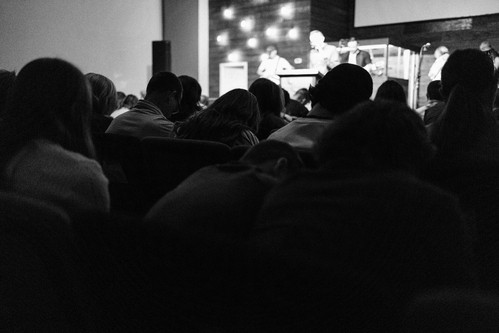May 8th, 2023
by John Rogers
by John Rogers
The Fear of the Lord is Elementary
by John Rogers

The book of Ecclesiastes, like the book of Proverbs is wisdom literature. Therefore, it is meant to enlighten us and to give us knowledge and wisdom as to what is wise and what is folly, what is good and what is bad. Ecclesiastes is the ABC's to the righteousness that has been counted to us. It is literature meant to raise us in the fear of the Lord, which Proverbs 9:10 says is the beginning of this knowledge.
But how should we rightly understand "the fear of the Lord?" In his book The Great Gain of Godliness, Puritan Thomas Watson tells us what this fear is and what it is not. Let’s begin with what it is not. First, it is not “of a natural fear, which is a tremor or palpitation of heart, [brought about] by the approach of some…danger.”
Second, it is not a sinful fear, meaning that it does not consist of superstition or carnality. It does not fear black cats and it does not fear men. This fear is not a fear that makes men “change their religion as the chameleon does her colors.” It does not fear torment or hell.
On the contrary, it is a divine fear. It is a fear that says “God is so great that [I am afraid] of displeasing him, and so good that [I am afraid] of losing him.” But it is not that we are afraid of God. He says, “There is a difference between fearing God, and being afraid of God; the godly [those in Christ] fear God as a child does his father, the wicked are afraid of God as the prisoner is of the judge.
In addition, this fear he says is mixed with several graces. Watson gives five, but I will only mention three. First, this fear is mixed with love. “The chaste spouse,” Watson says, “fears to displease her husband because she loves him.”
Second, this fear is mixed with faith. “By faith," he quotes Hebrews 11:7, "Noah…moved with fear, prepared an ark.” He says, “When the soul looks either to God’s holiness, or its own sinfulness, it fears, but it is a fear mixed with faith in Christ’s merit; the soul trembles, yet trusts…Fear is as lead to the net, to keep a Christian from floating into presumption, and faith is as cork to the net, to keep him from sinking in despair.”
And lastly, this fear is mixed with hope. “One would think,” he writes, “[that] fear would destroy hope, but it cherishes it. Fear is to hope as the oil to the lamp, it keeps it burning: the more we fear God’s justice, the more we may hope in his mercy.
Faith, hope, and love. These are the graces that are mixed with this fear. This fear is the beginning of knowledge. Without it we can't mature. And without we can't "advance to the next grade." It is fundamental. It is essential. It is necessary. This fear, that we’ve just learned more about from our dear Watson, is, in the words of Sherlock Holmes, “elementary.”
But how should we rightly understand "the fear of the Lord?" In his book The Great Gain of Godliness, Puritan Thomas Watson tells us what this fear is and what it is not. Let’s begin with what it is not. First, it is not “of a natural fear, which is a tremor or palpitation of heart, [brought about] by the approach of some…danger.”
Second, it is not a sinful fear, meaning that it does not consist of superstition or carnality. It does not fear black cats and it does not fear men. This fear is not a fear that makes men “change their religion as the chameleon does her colors.” It does not fear torment or hell.
On the contrary, it is a divine fear. It is a fear that says “God is so great that [I am afraid] of displeasing him, and so good that [I am afraid] of losing him.” But it is not that we are afraid of God. He says, “There is a difference between fearing God, and being afraid of God; the godly [those in Christ] fear God as a child does his father, the wicked are afraid of God as the prisoner is of the judge.
In addition, this fear he says is mixed with several graces. Watson gives five, but I will only mention three. First, this fear is mixed with love. “The chaste spouse,” Watson says, “fears to displease her husband because she loves him.”
Second, this fear is mixed with faith. “By faith," he quotes Hebrews 11:7, "Noah…moved with fear, prepared an ark.” He says, “When the soul looks either to God’s holiness, or its own sinfulness, it fears, but it is a fear mixed with faith in Christ’s merit; the soul trembles, yet trusts…Fear is as lead to the net, to keep a Christian from floating into presumption, and faith is as cork to the net, to keep him from sinking in despair.”
And lastly, this fear is mixed with hope. “One would think,” he writes, “[that] fear would destroy hope, but it cherishes it. Fear is to hope as the oil to the lamp, it keeps it burning: the more we fear God’s justice, the more we may hope in his mercy.
Faith, hope, and love. These are the graces that are mixed with this fear. This fear is the beginning of knowledge. Without it we can't mature. And without we can't "advance to the next grade." It is fundamental. It is essential. It is necessary. This fear, that we’ve just learned more about from our dear Watson, is, in the words of Sherlock Holmes, “elementary.”

More from the blog:
Love Your Neighbor As Yourself
February 23rd, 2026
Finding the Right Foundation for Your Life
February 16th, 2026
Sojourners in the Flesh
February 9th, 2026
Suffering is Not Pointless
February 2nd, 2026
Romans and Ratatouille
January 26th, 2026
A Taming of the Shrewd
January 19th, 2026
Commit Fully
January 12th, 2026
Keeping our Brothers
January 5th, 2026
Read the Bible in 2026
December 29th, 2025
A Challenge for Parents this Christmas
December 22nd, 2025
No One Can Snatch Me Out of My Father's Hand
December 15th, 2025
Light of the World, You Stepped Down into Darkness
December 8th, 2025
A Lesson from Two Rich Men
December 1st, 2025
Hold Up. Don't Fold Up.
November 24th, 2025
Surviving Trials is Not the Goal
November 17th, 2025
Recent
Archive
2026
2025
February
March
April
September
October
November
2024
March
April
September
October
2023
April
May
July
August
September



No Comments